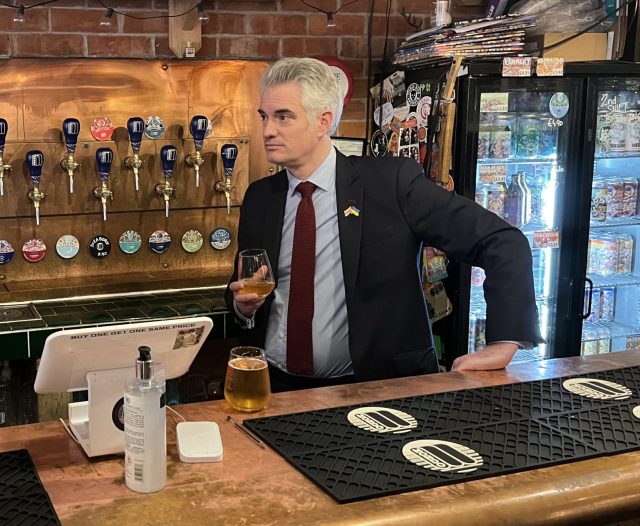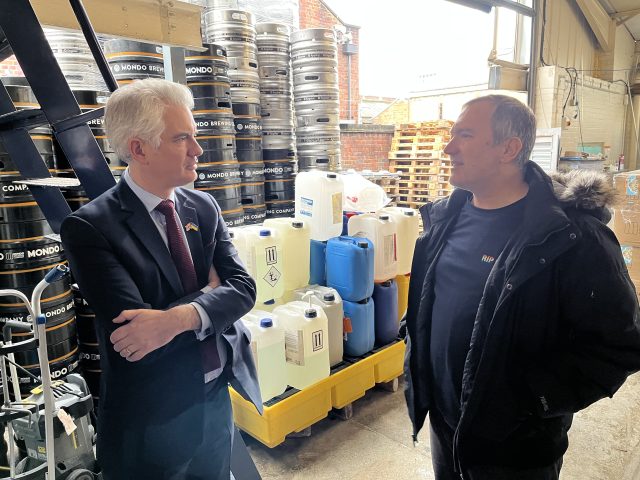Alcohol duty freeze provides ‘certainty for the months ahead’
By Louis ThomasAfter this week’s announcement of a freeze on alcohol duties until 1 August, db spoke with Exchequer Secretary to the Treasury James Cartlidge MP about what this means for the drinks industry.

Visiting London’s Mondo Brewing Company, Cartlidge, who revealed that he used to work as a barman at a Wetherspoons pub in Barnet, suggested that the freeze would provide a boost to the hospitality industry: “This is a measure which shows support for drinking as a social, positive thing”.
Indeed, the view from Mondo was that the move was good news for brewers. The freeze has also been well received by trade bodies.
Beyond 1 August 2023, the UK will see the most dramatic reforms to alcohol duty since the late 19th century, as announced in the 2021 Autumn Budget, take effect. The Treasury claims that the “higher strength, higher duty” approach is “common-sense”.
However, treading the tight rope of being fiscally responsible while supporting the drinks industry is easier said than done. Although wines between 11.5% and 14.5% ABV will have their duty calculated as if they were 12.5% for 18 months from the new system, fortified wines will not have the same, to quote the Wine & Spirits Trade Association (WSTA), “stay of execution”. db put this to Cartlidge: “I think the crucial point about the new regime is that it has a single underpinning logic, ultimately, which is taxation by strength. For the first time you have a situation where the amount of alcohol determines the amount of tax effectively. And it is true that following that logic, there will be an impact on for example, fortified wines, obviously, it’s not for me to comment on what potential impact that will have on sales.”
“I think overall, we’ve got a very positive message,” he continued, “which is that, as I confirmed to the House this week, we’re freezing duty for another six months, all forms of alcohol will benefit from that freeze. I think it sends a really strong message to the sector, which is that we’re running a responsible ship”.
Another critique that has been levelled is that replacing the three tax bands for wine with 27 is over-complicating things, but Cartlidge suggested that this would actually be a “much simpler regime”: “There is only one rate, the actual percentage you pay depends on the ABV…there will be different amounts of tax to pay, but it’s still one rate.”
Partner Content

Barry Watts, head of public affairs & policy at The Society of Independent Brewers (SIBA), who was also in attendance, suggested that the Small Producer Relief scheme (formerly Small Brewers Relief) might result in a shift towards lower-alcohol beer production: “Because of the duty review, we’re going to see more brewers reducing ABVs in their beer to get the relief”. To this, Cartlidge responded: “The market will respond in its own way”.
But the UK’s burgeoning wine industry might find it somewhat more challenging to respond. Though small beer and cider producers benefit from Small Producer Relief, small wine producers do not, unless they are making drinks below 8.5% ABV. Cartlidge defended this by pointing out that raising the ABV threshold would go “against the whole rationale of the change”.
However, he still maintained that the outlook was good for UK wine producers: “Because of these changes, the tax on English sparkling wine will fall significantly, as will the tax on any sparkling wine. But that’s because of this harmonisation and rationalisation of what is, I think, a much more simple system.”
“No-one no one is suggesting that everyone will always get what they want in terms of the different sectors,” he acknowledged, “but I think the changes this week have been broadly welcomed”.
On the feasibility of extending the freeze beyond 1 August, Cartlidge said: “In terms of future rates, that’s a matter for the Chancellor and the Budget…And what we’ve all said is that if there is any change in the Spring Budget, now I’m not saying there will be or won’t be, but whatever happens will come into play in August as well.”
The issue of energy costs, which the brewing sector has been particularly vulnerable to, was also posed by Mondo co-founder Todd Matteson. Cartlidge responded: “The biggest thing in the country is energy – the current Energy Bill Relief Scheme started running in October and ends in March and cost £18.1 billion. We have been clear that it has to be less generous next time: it has to be targeted. We have a duty to you [brewers], but part of that duty is to be fiscally sound as well.”
Related news
House of Lords raises its banquet corkage costs




